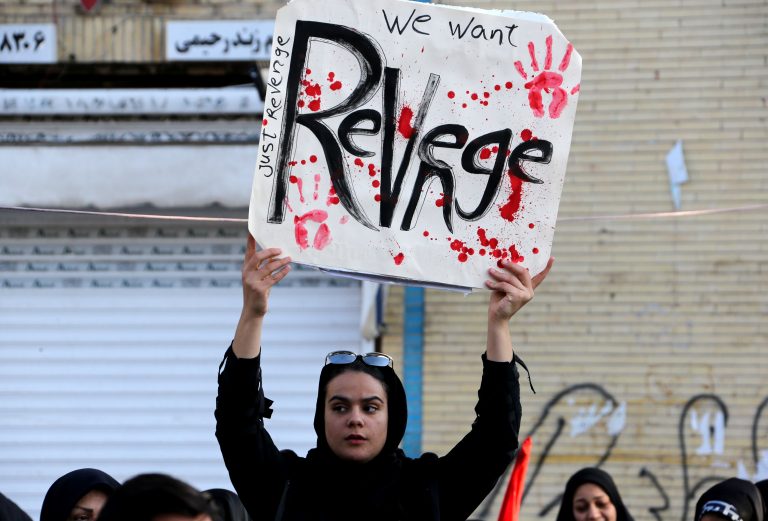Iran’s Chief Justice Ebrahim Raisi uttered threats that those responsible for General Qassem Soleimani’s assassination last year will “not be safe on Earth.” The statements were made during a memorial held at Tehran University on Jan. 1 to commemorate the one year anniversary of the Iranian General’s death at the hands of a U.S. drone strike ordered by President Trump. Rasi targeted the president, saying he was “not immune from justice.”
“They will witness severe revenge. What has come so far has only been glimpses,” said Raisi. “Do not presume that someone, as the president of America, who appeared as a murderer or ordered a murder, may be immune from justice being carried out. Never…Those who had a role in this assassination and crime will not be safe on Earth.”
“It’s even possible that there are people inside your home [the United States] that will respond to your crime.” — Esmail Qaani, Qassem Soleimani’s Successor
Soleimani was the head of the Islamic Revolutionary Guards Corps, Cuds Force, a U.S. designated Foreign Terrorist Organization, according to a statement issued by the Pentagon on Jan 2, 2020.
“General Soleimani was actively developing plans to attack American diplomats and service members in Iraq and throughout the region. General Soleimani and his Quds Force were responsible for the deaths of hundreds of American and coalition service members and the wounding of thousands more,” said the statement, which noted: “This strike was aimed at deterring future Iranian attack plans.”
Success
You are now signed up for our newsletter
Success
Check your email to complete sign up
Soleimani was succeeded by Esmail Qaani 12 hours after the air strike took place. According to an Aljazeera report on Jan. 20, 2020, Qaani said: “They hit him in a cowardly way, but with God’s grace and through endeavours of freedom-seekers around the world who want vengeance over his blood, we will hit his enemy in a manly fashion.”
Iran’s fury against President Trump persisted throughout the year. In June, Iran attempted to issue a warrant for Trump’s arrest, which was rejected by Interpol. In August, the regime showcased two ballistic missiles, one named after Soleimani.
On Dec. 23, President Trump gave Iran fair warning after missiles struck the U.S. Embassy in Baghdad: “Some friendly health advice to Iran: If one American is killed, I will hold Iran responsible. Think it over,” said Trump on his Twitter account.
Iran turned its rhetoric into something of a meme in a New Year’s Day Twitter post by the Iran Foreign Ministry, claiming: “By committing a craven act of terror against Gen Soleimani, the US violated int’l law & the UN Charter in a blatant violation of Iraqi sovereignty. The US’ lawlessness in full show.” Included was an inline graphic of Soleimani and a quote from United Nations Human Rights Council Special Rapporteur Agnes Callamard.
In June, Callamard issued a report criticizing the Trump administration’s killing of the Iranian regime’s general. U.S. Secretary of State Mike Pompeo called the report “spurious.” He explained: “The strike that killed Gen. Soleimani was in response to an escalating series of armed attacks in preceding months by the Islamic Republic of Iran and militias it supports on U.S. forces and interests in the Middle East region.”
Pompeo defended the assassination as a means “to deter Iran from launching or supporting further attacks against the United States or U.S. interests, and to degrade the capabilities of the Qods Force,” while saying Callamard’s report offers little besides “more cause to distrust UN human rights mechanisms.”
Esmail Qaani went so far as to allude to the possibility that Iran will commit domestic terrorism against the United States during the event: “It’s even possible that there are people inside your home [the United States] that will respond to your crime.”
Follow us on Twitter or subscribe to our email list
















